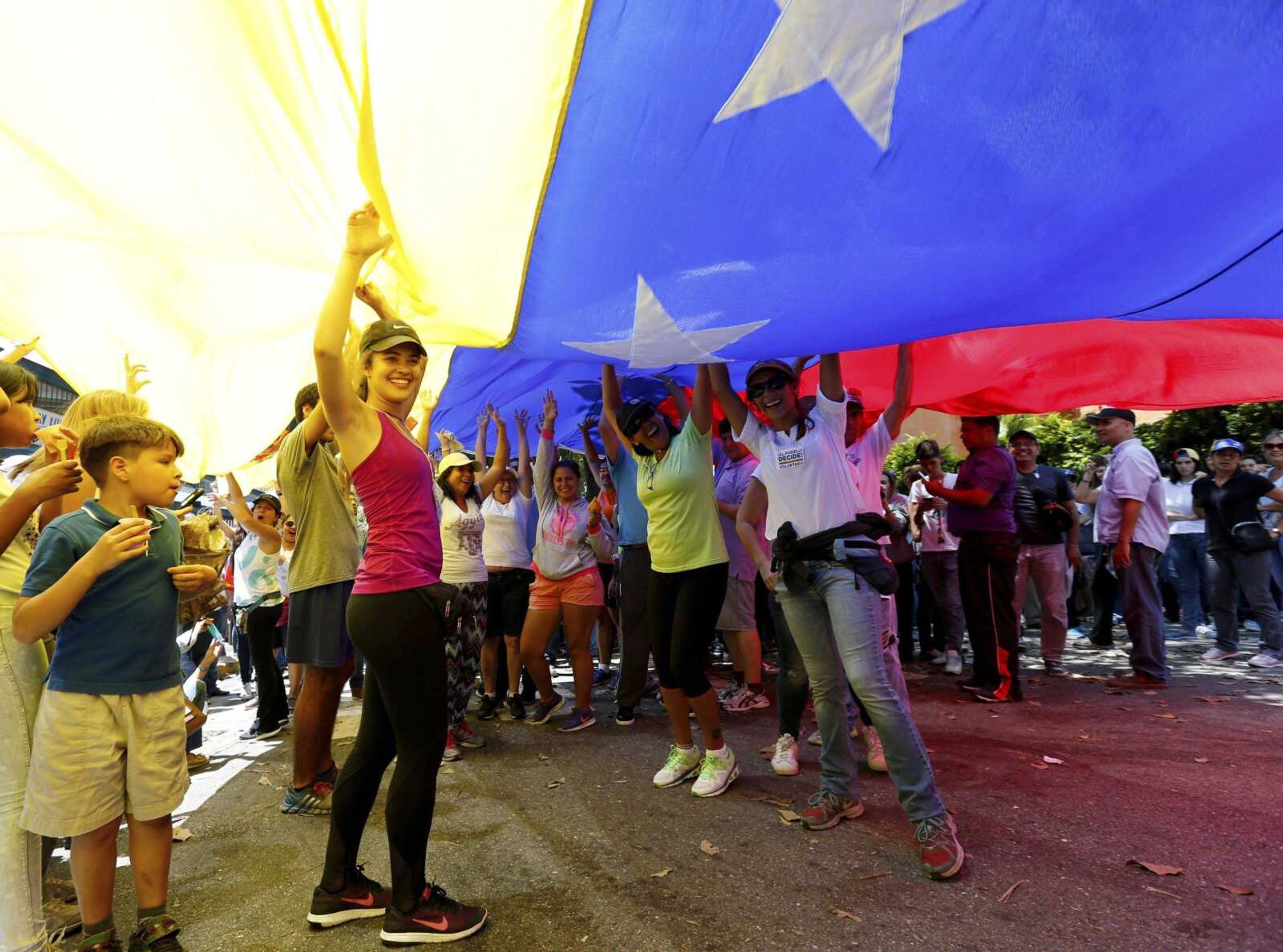Venezuelan opposition calls for nationwide strike
CARACAS, Venezuela -- Venezuelan opposition leaders called Monday for a 24-hour nationwide strike to increase pressure on the socialist government after more than 7 million people rejected a plan to rewrite the constitution and consolidate the ruling party's power over the country, which has been stricken by shortages and inflation and riven by more than 100 days of clashes between protesters and police...
CARACAS, Venezuela -- Venezuelan opposition leaders called Monday for a 24-hour nationwide strike to increase pressure on the socialist government after more than 7 million people rejected a plan to rewrite the constitution and consolidate the ruling party's power over the country, which has been stricken by shortages and inflation and riven by more than 100 days of clashes between protesters and police.
The opposition said the country's National Assembly, which it controls, would name new members to the government-dominated Supreme Court, setting up a showdown with President Nicolas Maduro, whose party controls nearly all other state institutions.
Opposition parties also plan to sign a declaration calling for the formation of an alternative "government of national unity," a step toward total rejection of government authority.
"Overall the package is pretty radical, especially the idea of a parallel government," said David Smilde, a Tulane University expert on Venezuela. "I think it could lead to real chaos."
But he said the opposition moves were to be implemented in phases over the next week, giving both sides the opportunity to negotiate possible concessions.
After some procedural moves in the National Assembly today, the opposition said it would launch a plan it called "zero hour" Wednesday that includes an agreement to form an alternate government and create 2,000 local committees that would function as street-level support for the opposition.
That will be followed Thursday by a nationwide strike, which could bring much of Venezuela's already sputtering economy to a standstill.
Venezuela's largest chamber of commerce told The Associated Press its members would not punish employees for participating in the strike.
On Friday, the opposition will name 13 judges to the supreme court to replace those named by the outgoing, ruling party-dominated congress in 2015 in a process legal experts said violated nomination procedures.
The nominations would not give the opposition a supreme-court majority but are almost certain to be rejected by the current court and the executive branch, making them a largely symbolic tactic to increase pressure on Maduro.
"We call on the whole country to launch a 24-hour national strike this Thursday, a massive, non-violent protest, as a way to pressure the government and to prepare for the final steps, which will be next week, to confront this fraud ... and to restore constitutional order," opposition leader Freddy Guevara said.
He didn't say what the final steps would be.
More than three months of street protests, which have left at least 93 people dead and 1,500 wounded. More than 500 protesters and government opponents have been jailed.
The opposition said 7.6 million Venezuelans participated in Sunday's symbolic referendum rejecting Maduro's plans for the July 30 election of an assembly that would remake the country's political system. Maduro's allies have called on the assembly to impose executive branch authority over the few remaining institutions outside the control of Venezuela's socialist ruling party.
Colombian President Juan Manuel Santos planned to discuss the Venezuelan crisis during a visit with President Raul Castro of Cuba, Venezuela's closest regional ally, Colombia's foreign minister said from Havana.
Colombia has dealt with rising tensions and a growing number of people crossing the border from Venezuela as the crisis in the oil-rich country deepened.
In Washington, the Trump administration called on Venezuela's government to cancel plans to form an assembly to rewrite the constitution, and to instead hold "free and fair elections."
White House press secretary Sean Spicer said the U.S. congratulated the Venezuelan people "for the huge turnout in the referendum" and the "unmistakable statement that they made and delivered to their government."
Sunday's vote was a strong but not overwhelming showing that fell short of the 7.7 million votes garnered by the opposition in 2015 legislative elections. Opposition leaders said that was because they were only able to set up 2,000 polling places in a symbolic exercise the government labeled as illegitimate. The opposition says it will convert those polling places into the new neighborhood-level committees.
Some supporters said they were disappointed.
"I thought it was going to be more," said Mariela Arana, a 56-year-old school counselor. "But these 7 million people spoke and it was plenty."
Sunday's vote was marred by violence when a 61-year-old woman was killed and four people wounded by gunfire after government supporters on motorcycles swarmed an opposition polling site at a church in western Caracas.
In smaller numbers in many parts of the capital, government supporters also went to polling stations on Sunday in a rehearsal for the July 30 vote.
Opponents of Venezuela's government blame it for turning one of the region's most prosperous countries into an economic basket case with a shrinking economy, soaring inflation and widespread shortages. The government blames the crisis on an economic war waged by its opponents and outside backers.
Connect with the Southeast Missourian Newsroom:
For corrections to this story or other insights for the editor, click here. To submit a letter to the editor, click here. To learn about the Southeast Missourian’s AI Policy, click here.









